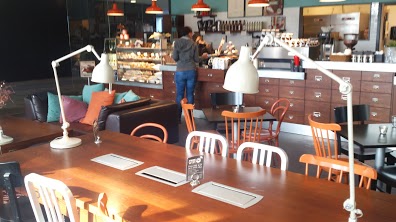Flexible workplaces - opportunity for energy reductions in urban regions
A new report by CESC and City of Stockholm describes the drivers and barriers to exploit the potential for energy saving by using flexible workplaces in urban regions.

CESC partner City of Stockholm and KTH has performed a qualitative interview study where owners
of co-working hubs in Stockholm were asked to give their view on drivers and barriers to establish
flexible workplaces close to residential areas in the suburbs and city districts.
The study also explores the possibility to establish a flexible workplace in the city district Stockholm Royal Seaport and to introduce information about flexible workplaces in a travel planner as an alternative to commuting.
Through the use of flexible workplaces it is possible to save energy in terms of reduced energy use through reduced travel and better use of heated indoor spaces.
The report is only available in Swedish. You can read it here: Flexibla arbetsplatser (pdf 1.1 MB)
Authors: Kramers, A. Söderholm, M.

